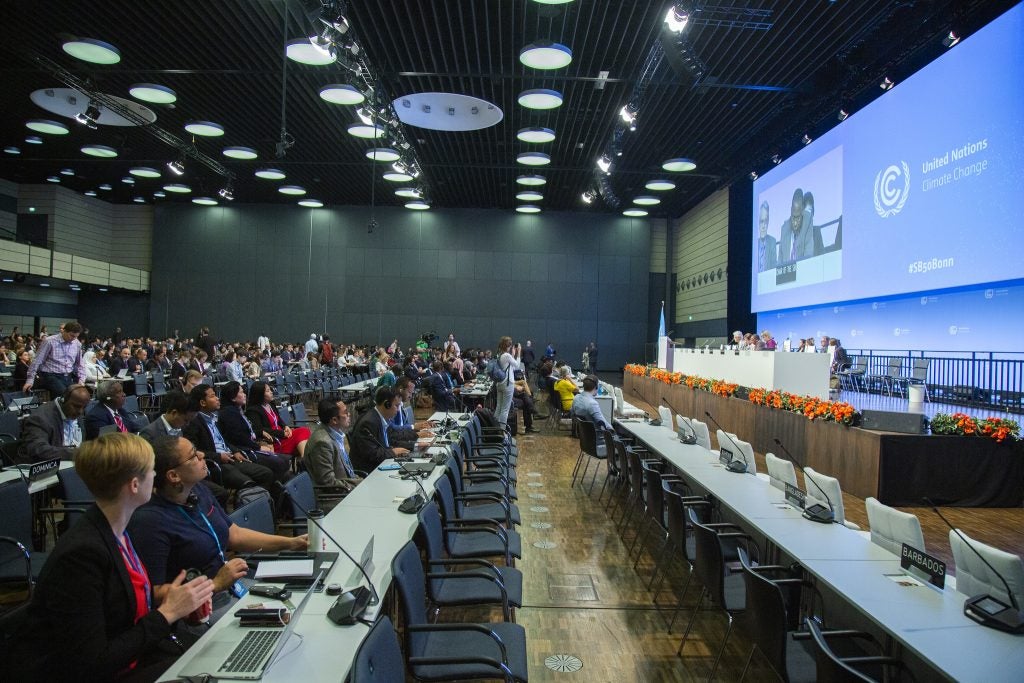
Bonn Climate Change Conference opening plenary. UNclimatechange
Negotiators are meeting in Bonn, Germany this week and next on the back of the successful negotiations in Katowice, Poland where the Paris climate agreement “rulebook” was mostly agreed, on time. A feat nearly unprecedented in the often glacial UN climate talks provides hope that countries can continue to work together in light of the urgency to address climate change.
The one exception to the success in Katowice was international cooperation through carbon markets. Despite taking the session into overtime, negotiators could not agree on a key chapter of that rulebook – the text meant to catalyze international cooperation on carbon markets under Article 6.
Among other things, Article 6 guidance will spell out how countries can “count” the results of international emissions reduction trading toward their Paris greenhouse gas reduction pledges (known as nationally determined contributions, or NDCs). Article 6 has three main components framing international cooperation under the Paris Agreement. Article 6.2 provides for the accounting framework, Article 6.4 establishes a new UNFCCC mechanism and Article 6.8 provides a framework for non-market approaches.
As one of the last items that need to be addressed after COP24, carbon markets will be a central focus of the negotiations in 2019 and Article 6 will benefit from additional political focus on the road to agreement at COP25 in Santiago de Chile in December.
Here we answer key questions about carbon markets and the UN climate talks.
Why is the Article 6 rulebook important?
First, because countries need it. Almost half of all countries have included international cooperation through carbon markets in their NDCs. Clear guidance on how international carbon market cooperation operates in the Paris Agreement will help market-based investment to flow at scale to or from these countries.
Second, because airlines need it. The Carbon Offsetting and Reduction Scheme for International Aviation (CORSIA), developed under the International Civil Aviation Organization (ICAO), is a market-based measure that caps international aviation’s net emissions at 2020 levels. Airlines will have to purchase emission reductions or offsets to fulfil their requirements under CORSIA starting in 2020. These mitigation outcomes will come from activities that take place in host countries that are Parties to the Paris Agreement.
ICAO just announced a call for applications by carbon offset programs that wish to apply for eligibility in CORSIA. CORSIA could provide the backbone of a global carbon market with broad participation, if implemented with transparency and environmental integrity. To do so countries must ensure that accounting guidance under the UNFCCC is robust and that decisions under CORSIA and the UNFCCC work together. Otherwise, CORSIA’s integrity and effectiveness at reducing aviation’s emissions will be jeopardized.
Third, because the climate needs high-integrity guidance under Article 6. The Paris agreement recognizes that international carbon market cooperation – if properly designed following common-sense “rules of the road” – can provide countries with an opportunity to increase their climate ambition over time, going faster and farther in reducing greenhouse gases than otherwise possible. Recent EDF analysis estimates that well-designed international carbon markets can nearly double the amount of global emissions reductions, with no additional cost.
If these rules are so important, why don’t we have them already?
At COP24 in Katowice, countries found it difficult to agree on an appropriate accounting approach for the new 6.4 mechanism in the context of the Paris Agreement, where all countries take a climate commitment. Parties also struggled to find balance in the rules agreed for the central 6.4 mechanism and those agreed for the more country driven international cooperation under Article 6.2.
Where are we now?
Despite the stalemate on Article 6, countries made important progress at the end of last year’s climate negotiations. If they can maintain this progress in the negotiations this year, a successful outcome at COP25 is possible.
Countries found agreement on the other areas of the Paris Agreement work program. Because the various elements of the rulebook must be internally consistent to be effective, agreement on these elements provides important context and a helpful foundation for resolving outstanding questions in the Article 6 guidance. For example, the agreed rulebook includes critical guidance clarifying how countries are to regularly and consistently report on their progress in implementing and achieving their NDCs. The rules for the “enhanced transparency framework” includes important provisions for international cooperation through carbon markets, including some key provisions necessary to avoid “double counting.”
Countries also reached agreement in the negotiating rooms at COP24 on most of the key transparency and review components necessary for robust accounting and on constituting the UNFCCC body that will supervise the Article 6.4 mechanism. These areas of agreement are included in the texts which serve as the starting place for the negotiations kicking off this week in Bonn.
Negotiators now have an opportunity to hone the progress they made last year while steering clear of major threats to environmental integrity, like double counting. They can look to the voices of business and civil society for support, as a wide range of companies, business groups, and environmental organizations are united in calling on countries to agree on clear accounting and transparency rules to avoid double counting (see the Katowice Declaration on Sound Carbon Accounting).
The stakes are high and the clock is ticking. Completing the Paris rulebook’s missing chapter this year with effective rules for international cooperation through carbon markets could help countries and airlines achieve ambitious climate goals for decades to come.









